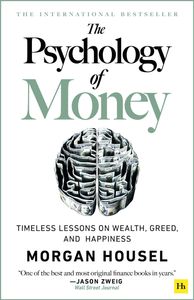The Psychology Of Money - Morgan Housel

Let me tell you the short version of the story of Ronald and Richard as told by Morgan Housel.
Ronald was a high school graduate in Vermont. He worked for 25 years as a mechanic in a gas station and then 17 years for JCPenny as a janitor.
Richard graduated from Harvard. He had an MBA and was a top executive for Merrill Lynch. He retired at 40 years old from his finance career to become a philanthropist.
Who do you think has a bigger net worth? If your answer is Richard, then you are wrong.
Ronald Read died in 2014 at the age of 92, with a net worth of $8 million. That is right! A part-time janitor passed away as a multimillionaire.
On the other hand, Richard Fuscone went bankrupt in 2008 because of his lifestyle inflation. Someone that actually studied finance, was a top performer in his career, and was recognized as a successful businessman, went bankrupt.
Morgan Housel, author of The Psychology of Money, described that as the difference between patience and greed. This really sets the tone for the rest of the book.
Let’s take a look at all the lessons I learned from The Psychology of Money.
Behavior vs Intelligence

Morgan talks about how being wealthy has little to do with your intelligence and more to do with your financial behavior.
This is evident in the story of Ronald and Richard. You can tell that the difference between them was how they both handled their money.
The reason Ronald was able to save this much money was because of his money behavior, not by winning the lottery or inheriting any money.
Ronald was able to consistently invest any extra income he had in the stock market. In addition, he lived a frugal life even as his money grew in the stock market. He held on to his positions for years, allowing compounding to work its magic.
This shows us that you do not need to study finance to become a millionaire. You certainly do not need a high income or a fancy education to be financially disciplined.
The Power of Compounding

As an investor myself, Warren Buffet is one of the people I respect and look up to. I knew his net worth was in the billions. However, I did not know that $81.5 billion out of roughly $84.5 billion net worth was made after Buffet turned 65.
When I read that, I was flustered. I always knew that compounding was very powerful, but I just did not think it was to this extent.
Today, Buffett's net worth is $125 billion. Buffet is known to beat market returns with an average return of 22% annually.
Our brains are not wired to understand things of this sort. Buffet made $3 billion between the ages of 11 and 65.From age 65 to 91, he made the rest of his fortune, which is roughly $122 billion.
To further clarify, Morgan compares Buffet to another investor, Jim Simons. Even though Simons is able to have an annual average return of 66%, which is 3 times more than Buffet, his net worth is only $28.6 billion.
The reason for this is that Simons did not allow his money to compound for as long as Buffet.
This brings me back to something I always tell new investors: time in the market is far better than timing the market.
This is why you should start investing as soon as possible. Even if it's as little as $10/month, let your money work for you as soon as possible.
Pay The Price

If you want to make money in the market, there is a price to pay. Not just the price of buying shares, but an emotional price to stomach the ups and downs of the stock market.
When someone invests in the stock market, there are two emotions that hold you back from making money.
The first emotion is greed. Many people want high returns consistently. But they fail to understand that what goes up must come down. That is why 85% of hedge fund managers fail to outperform the market.
The second emotion is fear. Fear holds many people back from letting their money compound in the market. In any given year, the stock market can have a decline of 20–30%.
If that were to happen, would you be able to see your money fall by much? Or should you continue to invest regardless of how low the market goes down?
The point being, volatility is the price you pay for being invested in the stock market. Even though many people understand that the stock market is bound to go up, they let their emotions take control.
Therefore, think of volatility as a fee for making money in the market. If you know you can't handle volatility, put your emotions aside and avoid looking at your investments all the time.
How Much is Enough?

The book displays an important point about how we are always comparing ourselves to people above us.
This is sad because no matter how well we are doing, we tend to always want more and compare our state to someone else's doing better than us.
Morgan begins to explain this by illustrating how a successful doctor who makes $500K per year living a nice lifestyle will feel insignificant next to a businessman making $25 million per year.
A businessman making millions of dollars per year will feel like he is not making enough next to someone bringing in billions of dollars per year. And the cycle goes on.
I like how the book signifies the importance of recognizing when enough is enough. That it is okay to reach a certain threshold and stop striving for a higher one.
Be Reasonable, Not Rational

The key point here is that most good decisions are not rational, but reasonable. I think this is a very good point because, as humans, we are often driven by our emotions, but that can be costly sometimes.
Morgan argues that being rational as an investor can ruin your financial returns. For instance, say you owe a stock that starts to tank. As a rational investor, you may be inclined to sell. However, doing so will take away your chance of making significant returns in the long term.
At age 11, Warren Buffet bought his first stock. He bought 6 shares of CIties Service. He bought it at a price of $38 per share. The stock then fell to $27, which caused him to panic and lose conviction.
The stock then starts to recover, and he sells it for a small profit, at a price of $40 per share. However, the stock then skyrockets immediately to $200 per share.
Bottom Line
There are many more lessons in The Psychology of Money. These were the takeaways that resonated with me the most. However, I strongly advise that you read the full book as it will change your relationship with money.
The book definitely changed my perspective on my financial life, and I'm sure it will do the same for you.

